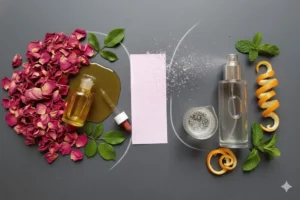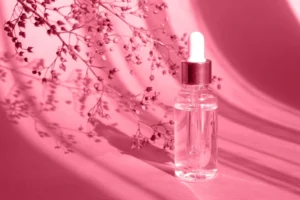A fragrance’s sillage (or fragrance’s projection) is what triggers a customer’s initial purchase decision, but its longevity is what builds long-term loyalty. The challenge for you, then, is determining which type to choose for your brand or store.
Each choice relates to a specific perfume composition: alcohol-based or oil-based perfumes. In today’s Jasmine article, we will clarify the key differences between the two, outline their pros and cons, and explain how to select the best fit for your market or specific use. Let’s get started.
What are Oil-Based Perfumes?
Highly concentrated perfume compositions, these are completely alcohol-free. They rely primarily on concentrated aromatic oils (essential oils) or oil-based carrier ingredients, such as fractionated coconut oil. They are distinguished by their excellent longevity on the skin, as they adhere to the body slowly and release their scent gradually. Oil-based fragrances are typically used in Oriental perfumery and are ideal for those seeking a deep, long-lasting aroma that endures for many hours.
Also read: Essential Oils: Types & Uses (Full Guide)
What Are Alcohol-Based Perfumes?
This is the most widespread and popular type in global markets, exemplified by Eau de Parfum and Eau de Toilette. They are a blend of aromatic oils and ethyl alcohol, which acts as the primary solvent and is responsible for projecting the scent forcefully immediately upon spraying. The alcohol then evaporates (or dissipates) gradually after application. The intensity (or strength) of the fragrance is determined by the ratio of aromatic oils to alcohol.
Also read: Perfumers Alcohol: Types & Best Alcohol for Perfume
Key Differences Between Oil-Based and Alcohol-Based Fragrances
When selecting the type of fragrance you wish to retail or adopt for your brand, understanding the distinctions between oil-based and alcohol-based compositions is crucial. These differences not only define the scent profile but also determine the product’s market identity and the type of customer you are targeting.
Composition
Oil-based fragrances are built upon a natural or synthetic oil base that holds the fragrance, resulting in a high concentration and a distinct density when applied. Conversely, ethyl alcohol is used as the core solvent in alcohol-based fragrances, facilitating the powerful and rapid projection of the scent immediately upon spraying, while also delivering an instantaneous feeling of freshness.
Longevity and Sillage
Aromatic oils exhibit significantly greater longevity on the skin, as the oily layer retains the scent and releases it gradually, providing a focused sillage that stays closer to the body. As for alcohol-based fragrances, they create a powerful and immediate scent trail upon application, but the rapid evaporation of the alcohol solvent results in their overall staying power diminishing faster.
Price and Production Cost
The production cost tends to be higher for oil-based fragrances since they rely on high concentrations of pure aromatic oils. This cost is relatively lower for alcohol-based fragrances and their solvents, though the final production volume is typically much larger, making the overall cost for each product type variable depending on the required final concentration.
You can consult our expert team at Jasmine; they will determine the most suitable fragrance formulation for your brand. Contact them now.
Also read: Perfumery: Types of Essential Oils Used

How to Choose the Right Perfume for Your Market Strategy?
To achieve higher sales, you need to select a fragrance type that aligns with your market’s needs and usage habits. So, how do you make this choice?
When to Choose Oil-Based Fragrances
- Targeting Middle Eastern Markets: These markets show a distinct preference for powerful, luxurious oil fragrances with superior longevity. This is largely due to the cultural association with materials like Oud and Musk, which are traditionally offered in high oil concentrations.
- Designing Fragrances for Sensitive Skin: The alcohol-free formula completely eliminates the potential for skin irritation or dryness, making these fragrances a safe and personal choice for those with sensitivity issues.
- Expanding into Massage and Home Fragrance Products: Aromatic oils are essential components in the formulation of massage oils, home diffusers, and other body care products. This opens up wide avenues for diversifying your brand’s product portfolio.
- For Niche or Luxury Brands: The high concentration of aromatic notes in oils conveys an impression of luxury and exclusivity. This is ideal for brands that want to emphasize the quality and purity of the ingredients rather than the sheer volume of the packaging.
Also read: Niche Perfumes: What They Are & How Differ from Designer
When to Choose Alcohol-Based Fragrances
- Meeting Demand in Western Markets: Alcohol-based fragrances dominate the global perfume market due to their ease of use and variety of concentrations. They are suitable for products that require powerful, quick scent diffusion and large packaging formats for mass marketing.
- Operating on a Lower Production Budget: As a solvent, alcohol is significantly less expensive than concentrated aromatic oils. This allows you to produce larger volumes at a competitive price for medium-concentration products.
- For Commercial Ventures: Alcohol-based fragrances are recommended when you aim to produce high quantities of scents at a competitive price, as their cost is easier to manage and they are simpler to distribute across multiple sales outlets.
- Seasonal and Temporary Occasions: Alcohol-based options are perfect for seasonal marketing campaigns or light summer scents that require quick diffusion without the need for extreme longevity.
Even if you are undecided about the best choice, we at Jasmine can help you determine the optimal fit for your brand and store. Get in touch with our team, and let’s get started.
Also read: Generic Perfumes: What is It & How to Start Your Own Line?

Pros and Cons of Selling Oil-Based and Alcohol-Based Perfumes
Before launching your product line, familiarize yourself with the advantages and challenges associated with each type.
Advantages
Oil-Based Fragrances
- Profit Margin & Perceived Value: Oils are viewed as an extremely concentrated, luxury product, allowing for greater pricing flexibility and the realization of higher profit margins, given their superior concentration and extended longevity.
- Product Safety & Storage: Their complete absence of alcohol means they are not classified as a flammable substance, which streamlines logistics, simplifies international shipping procedures, and mitigates storage risks.
- Niche Appeal & Local Demand: They excel at satisfying the demand of regional markets that favor the purity and high staying power of Oriental fragrances—a key factor that can significantly differentiate your brand in the specialty sector.
Alcohol-Based Fragrances
- Mass Appeal & Market Acceptance: They offer fast-diffusing, potent scents that appeal to a vast segment of global consumers, thereby expanding your customer base and boosting overall sales volume.
- Automated Production & Filling: The manufacturing and filling process for alcohol-based fragrances is highly efficient and largely automated, allowing you to produce massive quantities at a relatively low cost and rapidly fulfill large orders.
- Lightness & Daily Wear: Alcohol-based scents have a lighter trail and offer a refreshing feel, making them perfectly suited for everyday use or casual occasions without overpowering the senses.
Disadvantages
Oil-Based Fragrances
- High Initial Cost & Filling Difficulty: Raw oils demand a very high initial investment due to their purity. Furthermore, filling them into small containers requires high precision, which complicates automated production processes.
- Usage Limitations & Staining: Their scent is concentrated and stays close to the skin, which may not satisfy customers seeking a strong, noticeable sillage (projection). Added to this is the potential for leaving oily residue or stains on light-colored fabrics.
- Marketing & Geographic Scope: Their strong marketing is often confined to markets that favor traditional Oriental fragrances, inevitably imposing restrictions on your brand’s potential for expansion into Western markets.
Alcohol-Based Fragrances
- Safety Issues & International Shipping: Alcohol is classified as a hazardous substance with a high degree of flammability. This increases the complexity of international shipping and storage and necessitates the implementation of strict safety protocols and regulations.
- Volatility & Lasting Value: Due to the rapid evaporation of the alcohol, these fragrances quickly lose their longevity on the skin and require frequent reapplication, which shortens the scent’s lifespan compared to oils.
- Skin Irritation: High concentrations of ethyl alcohol can increase skin dryness for some customers and may cause irritation, demanding caution when selecting the product for those with known sensitivities.
Whatever type of fragrance you lean towards producing, choosing a professional manufacturing partner is what makes the difference. Jasmine will be your supporter in developing a comprehensive production line that balances quality and cost while providing your brand with a unique olfactory identity.

Launch Your Own Branded Fragrances with Jasmine
The decision to start your own fragrance brand comes with significant production and logistical challenges. Therefore, consider leveraging the expertise of an experienced manufacturer that offers comprehensive production capabilities. By partnering with Jasmine, you ensure a smooth path to creating and selling your own internationally quality fragrances.
Advantages Jasmine Provides as Your Partner
- International Expertise and Extensive Network We offer years of experience and a broad agent network covering over 40 countries, which enhances your product’s potential for global distribution.
- Private Label Manufacturing Services We handle all production phases, starting from the development of your unique formulation all the way to final filling and packaging under your brand name.
- Full Design and Customization We provide you with the option to design your packaging, labels, and boxes in a way that truly reflects your brand’s vision and values.
- Integrated Logistics and Export Support We offer full support for export and shipping processes, simplifying logistical procedures and enabling you to focus entirely on sales.
- Adherence to Standards and Quality Jasmine manufactures its products according to the highest global quality standards, guaranteeing a final product that meets consumer expectations.
- Fragrance Formulation Development We have a team of experts who will help you develop a unique fragrance formulation that distinguishes you from competitors in the market.
- Commitment to Quality Standards (GMP) All our production processes comply with the highest internationally approved manufacturing specifications (GMP) to ensure the purity and safety of the product.
- Speed in Execution and Delivery Our fast and efficient production lines ensure you receive your orders on the agreed-upon schedule without delay.
- Licensing and Necessary Permits We undertake the task of obtaining all required licenses and permits in Turkey, saving you the hassle of complex legal procedures.
Jasmine Factory ensures your project proceeds with measured steps and with quality that elevates market standards. We provide you with offers on samples and production plans, along with marketing advice that gives you an edge over the competition.
Also read: Private-Label Perfume Manufacturing in Turkey for Brand Customization
FAQ about Oil-Based Perfumes
What are oil-based fragrances?
Oil-based perfumes are alcohol-free perfume compositions that rely on concentrated oils dissolved in an oil-based carrier substance. They are characterized by their superior longevity on the skin and an intimate sillage that stays close to the body.
Is fragrance oil the same as perfume?
The Fragrance Oil (also called essential oil or aromatic compound) is the concentrated, raw, and essential ingredient of the scent, whether it is natural or synthetic. A Perfume (or finished fragrance) is the final product ready for use, consisting of the fragrance oil diluted with a solvent (such as alcohol or a carrier oil) and other stabilizers.
What are the most popular types of fragrance oils?
Among the most famous fragrance oils that form the base of perfumes are Oud (Agarwood oil), Musk, and Amber, known for their longevity and luxurious Oriental depth. Additionally, floral oils like Rose and Jasmine are widely used in various global formulations.
Which fragrances are more profitable: oil-based or alcohol-based?
Oil-based fragrances typically allow for higher profit margins per unit due to their increased perceived value and demand as a luxury, long-lasting product. Alcohol-based fragrances, however, often provide greater overall profitability through large sales volume, ease of automated manufacturing, and lower unit production cost.